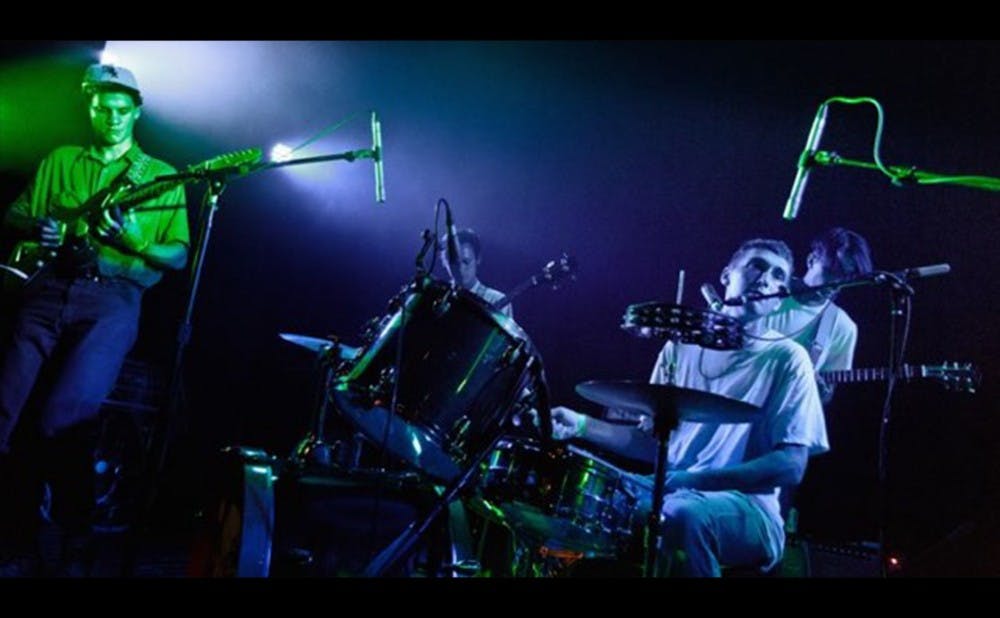Seen in a live setting, Whitney looks almost inside-out. At the front of the stage, where rock convention suggests the lead singer should be standing with guitar in hand, Julien Ehrlich sits hunched over a drum set, a coat draped over his shoulders and a microphone dangling from above. The guitars, keyboard and trumpet that complete Whitney’s live roster take a back seat to Ehrlich, who acts as both lead singer and drummer—an unconventional combination, to say the least.
“Labels were kind of expressing weird trepidation toward the whole thing, and it actually has wound up being the weird quirk that I think has made our band work,” Ehrlich said after Whitney’s show at Duke Coffeehouse Wednesday night.
In a concert that began to draw a line nearly an hour before doors opened, Indiana-based quintet Hoops opened for Whitney, whose debut album “Light Upon the Lake”was greeted to wide acclaim earlier this year. Both bands presented sets full of sunny indie rock, prompting an ironic toast from Hoops bassist Kevin Krauter midway through his band’s set: “Here’s to guitar music!”
But anyone in attendance Wednesday could see how drums, more than guitar, truly drive Whitney’s music. Ehrlich’s joint role as drummer and singer dictates the pace of his band; snare hits and strategic pauses punctuate each line of lyrics, and taut verses give way to cathartic choruses. Above all this rises Ehrlich’s distinctive falsetto, an unrefined but effective voice that brings out the pathos and nostalgia in Whitney’s tunes.
It was the moments where Ehrlich took a break from singing and let the drums take over, though, that felt the most loose and inspired. On instrumental “Red Moon,” the band broke into an extended jam led by Ehrlich’s improvised drumming—afterward, Ehrlich told the audience, “That was, like, the most fun we’ve ever had playing ‘Red Moon.’”
During the “encore” (Coffeehouse has no backstage, so the band simply hung out on stage for a few minutes), Whitney closed with their most popular single “No Woman,” adding an instrumental reprise that similarly brought out the band’s spontaneous side. Ehrlich noted that nearly every song had improvised elements in the show, which he described as a “constant conversation” between band members.
“I don’t think that we would be able to really do shows if we were the type of band that was like, ‘you have to play this way every single night,’” Ehrlich said. “We thrive on making each other happy and making each other laugh every night.”
Hoops, which has emerged as an up-and-coming indie act, started the night with the same lively spirit. Their set comprised cuts from their most recent, self-titled EP and their early mixtapes, minus the washed-out reverb and tape hiss that permeate their studio work. Here, the tunes were punchy and sometimes downright funky, recalling everything from ‘80s new wave to more recent bands like Real Estate.
Whitney took the stage next, interspersing songs from their debut with a couple choice covers, and although ostensibly a “new” band, its members are veterans in the music world. Like so many others in the rock pantheon, Whitney’s story began with a myth.
Mirroring the similarly compelling yet dubious origin tale of Bon Iver, the narrative that music media love to repeat goes something like this: in the dead of an especially harsh Chicago winter, Julien Ehrlich and Max Kakacek holed up in an apartment with nothing but an old guitar to keep them warm, still nursing the wounds of the breakups of old bands and romantic relationships and in the process crafting ten jewels of nostalgic pop now known as “Light Upon the Lake.”
The irony of this story, of course, is that “Light Upon the Lake” is anything but wintry. The record—released in June—all but radiates warmth; one can easily imagine it as a soundtrack for a summer fling or impromptu road trip. Ehrlich made it clear that the legend of Whitney’s formative winter was, for the most part, fiction.
“The winter was actually the down part where we only got two songs done and they didn’t even make the album,” he said. “In the winter, you’re just hoping and wishing for something to come to you, and a lot of times it didn’t for us.”
According to Ehrlich, many of the songs on the record were conceived during the fall, before the bitter cold—and the creative paralysis it brings—set in, and during the spring, once the ice finally thawed. “Light Upon the Lake,” then, is an ode to both the beginning and the end of those summer days bridging the gap between blizzards, borne of equal parts longing and hope.
Ehrlich also dropped some hints on the follow-up to “Light Upon the Lake,” which he said was already in the works and, in his opinion, even better than the first.
“It’s gonna be a nighttime record,” Ehrlich said. “[“Light Upon the Lake”] sounds, to me at least, like you could listen to it from breakfast until dinner and then you put it away and listen to Jeremih or something. This next one will definitely be more like lunchtime to when you pass out at 4 a.m.”
In a week where temperatures finally dipped below 70 and sweaters began to make their debuts, Wednesday’s show felt like the last celebration of a now-bygone summer. If only for a night, Hoops and Whitney had the crowd at Duke Coffeehouse bouncing and sweating and singing along like it wasn’t the midst of midterm season. In Ehrlich’s own words, “those golden days snuck away from us.” If so, this was a fitting farewell.
Get The Chronicle straight to your inbox
Signup for our weekly newsletter. Cancel at any time.

